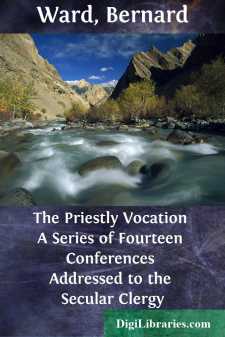Categories
- Antiques & Collectibles 13
- Architecture 36
- Art 48
- Bibles 22
- Biography & Autobiography 813
- Body, Mind & Spirit 142
- Business & Economics 28
- Children's Books 15
- Children's Fiction 12
- Computers 4
- Cooking 94
- Crafts & Hobbies 4
- Drama 346
- Education 46
- Family & Relationships 57
- Fiction 11828
- Games 19
- Gardening 17
- Health & Fitness 34
- History 1377
- House & Home 1
- Humor 147
- Juvenile Fiction 1873
- Juvenile Nonfiction 202
- Language Arts & Disciplines 88
- Law 16
- Literary Collections 686
- Literary Criticism 179
- Mathematics 13
- Medical 41
- Music 40
- Nature 179
- Non-Classifiable 1768
- Performing Arts 7
- Periodicals 1453
- Philosophy 64
- Photography 2
- Poetry 896
- Political Science 203
- Psychology 42
- Reference 154
- Religion 513
- Science 126
- Self-Help 84
- Social Science 81
- Sports & Recreation 34
- Study Aids 3
- Technology & Engineering 59
- Transportation 23
- Travel 463
- True Crime 29
The Priestly Vocation A Series of Fourteen Conferences Addressed to the Secular Clergy
by: Bernard Ward
Description:
Excerpt
CONFERENCE I
THE PRIESTLY VOCATION
IT is well known that one of the great aims of Cardinal Manning during his long episcopate, and perhaps the one of his works which has left the most permanent impression behind it, was to raise the tone and status of his diocesan clergy. For many reasons connected with our Catholic history, the level at which the average secular priest in the days of the Vicariates aimed left something to be desired. When we read the story of penal times, and realise the kind of life that an ordinary priest had to live, it is not surprising that the tone and quality of mind which we somewhat vaguely designate under the name of the "Ecclesiastical spirit," should not have been largely developed.
We are not speaking now of the time of actual persecution. In the days when a priest had to go about his duties in the continual risk of being apprehended and cast into prison, and being condemned on trial to be hanged, drawn and quartered, the heroism of his life, and the manner in which he had to be almost continuously braving personal danger in his search after souls, would undoubtedly have taken the place of much training and prayer in sanctifying his soul. But with the relaxation of active persecution, came an imminent danger which showed itself throughout the dreary eighteenth century, and during the first half of the nineteenth. There was no longer any fear of violence, and even the depressing penal laws invented after the Revolution of 1688 gradually lost their vitality and ceased to be enforced. But the spirit engendered by these laws lasted longer than the laws themselves, and when the English clergy found themselves able to live the normal life of a secular priest, some stimulus was required to revive in them the spirit of their state, which had been so long obscured by the necessity of hiding their priesthood.
For consider what the ordinary life of a priest was even in the later days of the Vicariates. He dressed as a layman; he did not even venture to wear black, but wore the ordinary coloured coats common at that day. If he was not a chaplain to one of the old Catholic families, he would live in his own hired lodging, by himself, and in the utmost poverty. Only rarely would he have the opportunity of meeting a brother priest. Daily mass was at that time not usual. Even the Sunday services were of a very unpretending character, consisting for the most part of low mass, with some English prayers before or after. The "chapels" had little external signs of devotion beyond the altar itself. Statues of our Lady and the Saints were unknown, for it would have been considered highly imprudent to run counter to strong Protestant prejudice in matters which were not essential. The sacraments were administered with as much privacy as possible: the priest would hear Confessions in his own room; and having no font, would take Baptism water privately to the house of a child who was to be baptised. No vestments would be worn on such occasions, except perhaps a stole over a lay coat....


